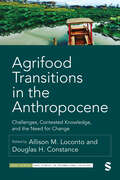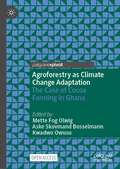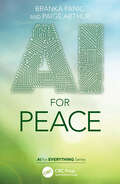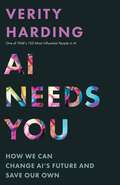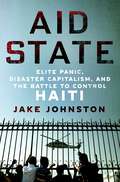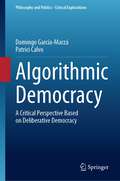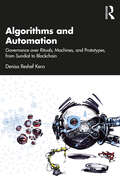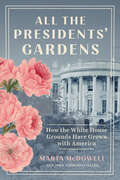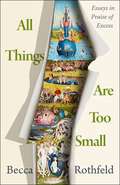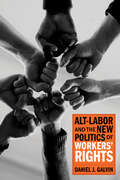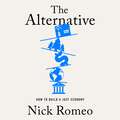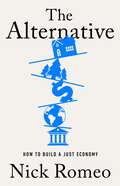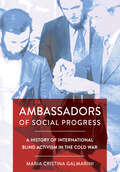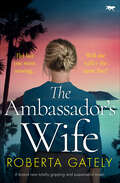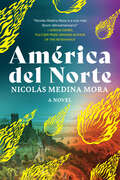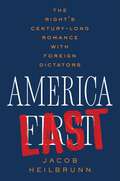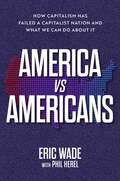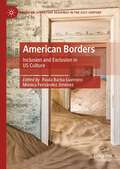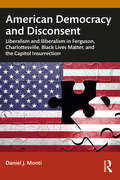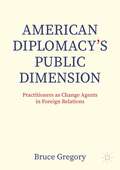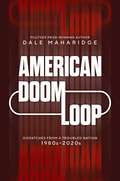- Table View
- List View
Agrifood Transitions in the Anthropocene: Challenges, Contested Knowledge, and the Need for Change (SAGE Studies in International Sociology)
by Allison M. Loconto Douglas H. ConstanceThe greatest challenges of the twenty-first century stem from the fact that we are now living in a new epoch: the Anthropocene. The human footprint on the planet can no longer be denied. One of the greatest and most essential human innovations, agriculture, is being increasingly recognised as a leading contributor to climate change. According to global governance bodies, the world will need to feed a predicted nine billion people by 2050. However, in this Anthropocene, we must address the environmental inequalities in how these people will be fed. This book explores our current societal struggles to transition towards more sustainable agrifood systems. It suggests that debates around sustainable agriculture must be social as well as technical, exploring the growth of social movements campaigning for more democratic food systems. However, as each chapter demonstrates, both the problems and the solutions in sustainable agriculture are highly contested. Using the term ′agrifood′ to capture the nexus between research, governance and the environment knowledge-environment-governance, this book provides an in-depth and wide-ranging account of current research around agricultural production and food consumption. The book introduces the Anthropocene along with the fundamental question that it poses about human-nature interactions. It outlines the core concerns related to agriculture and food and the debates around the need for agrifood system transitions. Each chapter investigates controversies in the field through case studies. These contributions offer a call for sociologists of agriculture and food to engage with the controversies unfolding in the Anthropocene.
Agrifood Transitions in the Anthropocene: Challenges, Contested Knowledge, and the Need for Change (SAGE Studies in International Sociology)
by Allison M. Loconto Douglas H. ConstanceThe greatest challenges of the twenty-first century stem from the fact that we are now living in a new epoch: the Anthropocene. The human footprint on the planet can no longer be denied. One of the greatest and most essential human innovations, agriculture, is being increasingly recognised as a leading contributor to climate change. According to global governance bodies, the world will need to feed a predicted nine billion people by 2050. However, in this Anthropocene, we must address the environmental inequalities in how these people will be fed. This book explores our current societal struggles to transition towards more sustainable agrifood systems. It suggests that debates around sustainable agriculture must be social as well as technical, exploring the growth of social movements campaigning for more democratic food systems. However, as each chapter demonstrates, both the problems and the solutions in sustainable agriculture are highly contested. Using the term ′agrifood′ to capture the nexus between research, governance and the environment knowledge-environment-governance, this book provides an in-depth and wide-ranging account of current research around agricultural production and food consumption. The book introduces the Anthropocene along with the fundamental question that it poses about human-nature interactions. It outlines the core concerns related to agriculture and food and the debates around the need for agrifood system transitions. Each chapter investigates controversies in the field through case studies. These contributions offer a call for sociologists of agriculture and food to engage with the controversies unfolding in the Anthropocene.
Agroforestry as Climate Change Adaptation: The Case of Cocoa Farming in Ghana
by Mette Fog Olwig Aske Skovmand Bosselmann Kwadwo OwusuThis open access book provides multidisciplinary perspectives on the potential of agroforestry to mitigate the negative impacts of climate change on cocoa production. Against the backdrop of increasingly precarious farmer livelihoods, it focuses on cocoa-agroforestry in Ghana – the second largest producer of cocoa in the world. Taking the reader on a journey across experimental plots and on-farm studies, the book delivers a holistic understanding of cocoa-agroforestry. Chapters examine historical yield and climate interactions, the effects of heat and drought on cocoa plants and the role of differing shade trees on soil fertility, yields, pests and diseases. The book discusses the socioeconomics of shade tree management, including cost-benefits, tree rights and competition for natural resources emphasizing policy implications and recommendations.Taking a multidisciplinary approach to climate-agriculture interactions, the book provides an innovative understanding of agroforestry and perennial cropping systems that goes beyond the Ghanaian cocoa belt. It is of relevance to students, researchers, farmers, practitioners and policymakers working with agroforestry and climate change adaptation.This is an open access book.
AI for Peace (AI for Everything)
by Branka Panic Paige ArthurThe role of artificial intelligence in war is widely recognized, but is there also a role for AI in fostering peace and preventing conflict? AI for Peace provides a new perspective on AI as a potential force for good in conflict-affected countries through its uses for early warning, combating hate speech, human rights investigations, and analyzing the effects of climate change on conflict. This book acts as an essential primer for introducing people working on peacebuilding and conflict prevention to the latest advancements in emerging AI technologies and will act as guide for ethical future practice. This book also aims to inspire data scientists to engage in the peacebuilding and prevention fields and to better understand the challenges of applying data science in conflict and fragile settings.
AI Needs You: How We Can Change AI's Future and Save Our Own
by Verity HardingA humanist manifesto for the age of AIArtificial intelligence may be the most transformative technology of our time. As AI&’s power grows, so does the need to figure out what—and who—this technology is really for. AI Needs You argues that it is critical for society to take the lead in answering this urgent question and ensuring that AI fulfills its promise.Verity Harding draws inspiring lessons from the histories of three twentieth-century tech revolutions—the space race, in vitro fertilization, and the internet—to empower each of us to join the conversation about AI and its possible futures. Sharing her perspective as a leading insider in technology and politics, she rejects the dominant narrative, which often likens AI&’s advent to that of the atomic bomb. History points the way to an achievable future in which democratically determined values guide AI to be peaceful in its intent; to embrace limitations; to serve purpose, not profit; and to be firmly rooted in societal trust.AI Needs You gives us hope that we, the people, can imbue AI with a deep intentionality that reflects our best values, ideals, and interests, and that serves the public good. AI will permeate our lives in unforeseeable ways, but it is clear that the shape of AI&’s future—and of our own—cannot be left only to those building it. It is up to us to guide this technology away from our worst fears and toward a future that we can trust and believe in.
Aid State: Elite Panic, Disaster Capitalism, and the Battle to Control Haiti
by Jake JohnstonHaiti’s state is near-collapse: armed groups have overrun the country, many government officials have fled after the 2021 assassination of President Moise and not a single elected leader holds office, refugees desperately set out on boats to reach the US and Latin America, and the economy reels from the after-effects of disasters, both man-made and natural, that destroyed much of Haiti’s infrastructure and institutions. How did a nation founded on liberation—a people that successfully revolted against their colonizers and enslavers—come to such a precipice?In Aid State, Jake Johnston, a researcher and writer at the Center for Economic and Policy Research in Washington, DC, reveals how long-standing US and European capitalist goals ensnared and re-enslaved Haiti under the guise of helping it. To the global West, Haiti has always been a place where labor is cheap, politicians are compliant, and profits are to be made. Over the course of nearly 100 years, the US has sought to control Haiti and its people with occupying police, military, and euphemistically-called peacekeeping forces, as well as hand-picked leaders meant to quell uprisings and protect corporate interests. Earthquakes and hurricanes only further devastated a state already decimated by the aid industrial complex. Based on years of on-the-ground reporting in Haiti and interviews with politicians in the US and Haiti, independent aid contractors, UN officials, and Haitians who struggle for their lives, homes, and families, Aid State is a conscience-searing book of witness.
Algeria: Selected Issues Paper (Imf Staff Country Reports #Country Report No. 14/342)
by International Monetary Fund. Middle East and Central Asia Dept.A report from the International Monetary Fund.
Algorithmic Democracy: A Critical Perspective Based on Deliberative Democracy (Philosophy and Politics - Critical Explorations #29)
by Domingo García-Marzá Patrici CalvoBased on a deliberative democracy, this book uses a hermeneutic-critical methodology to study bibliographical sources and practical issues in order to analyse the possibilities, limits and consequences of the digital transformation of democracy. Drawing on a two-way democracy, the aim of this book is intended as an aid for thinking through viable alternatives to the current state of democracy with regard to its ethical foundations and the moral knowledge implicit in or assumed by the way we perceive and understand democracy. It is intended to stimulate reflection and discussion on the basis that, by addressing what we understand as democracy, we can inevitably influence the reality known as democracy. Democracy’s evident regression in today’s world makes this all too apparent: it has become a hostage to all kinds of autocracies and technopopulisms, which are supported to a greater or lesser extent by the current algorithmic revolution.
Algorithms and Automation: Governance over Rituals, Machines, and Prototypes, from Sundial to Blockchain
by Denisa Reshef KeraTo enact the book’s central theme of automation and human agency, the author designed a Bot trained on her book to support dialogue with the content and facilitate discussions. If you like to compare what the author says and Bot ‘interprets’ or generates, go here https://www.anonette.net/denisaBot/ Algorithms and Automation: Governance over Rituals, Machines, and Prototypes, from Sundial to Blockchain is a critical examination of the history and impact of automation on society. It provides thought-provoking perspectives on the history of automation and its relationship with power, emphasizing the importance of considering the social context in which automation is developed and used. The book argues that automation has always been a political and social force that shapes our lives and futures, rather than a neutral tool. The author provides a genealogy of automation, tracing its development from ancient rituals to modern-day prototypes, and highlights the challenges posed by new technologies such as blockchain and artificial intelligence. The volume argues that we need more democratic and accountable governance over technological innovation to ensure that it respects human rights, political pluralism, legitimacy, and other values we hold dear in our institutions and political processes. An engaging read on a fascinating topic, this book will be indispensable for scholars, students, and researchers of science and technology studies, digital humanities, politics and governance, public policy, social policy, system design and automation, and history and philosophy of science and technology. It will also be of interest to readers interested in the interactions of the sciences and the social sciences and humanities.
All the Presidents' Gardens: How the White House Grounds Have Grown with America
by Marta McDowellThis New York Times bestseller shares the rich history of the White House grounds, revealing how the story of the garden is also the story of America. The 18-acres surrounding the White House have been an unwitting witness to history—kings and queens have dined there, bills and treaties have been signed, and presidents have landed and retreated. Throughout it all, the grounds have remained not only beautiful, but also a powerful reflection of American trends. In All the Presidents' Gardens bestselling author Marta McDowell tells the untold history of the White House grounds with historical and contemporary photographs, vintage seeds catalogs, and rare glimpses into Presidential pastimes. History buffs will revel in the fascinating tidbits about Lincoln&’s goats, Ike's putting green, Jackie's iconic roses, Amy Carter's tree house, and Trump's controversial renovations. Gardeners will enjoy the information on the plants whose favor has come and gone over the years and the gardeners who have been responsible for it all. As one head gardener put it, &“What&’s great about the job is that our trees, our plants, our shrubs, know nothing about politics.&”
All Things Are Too Small: Essays in Praise of Excess
by Becca RothfeldA glorious call to throw off restraint and balance in favor of excess, abandon, and disproportion, in essays ranging from such topics as mindfulness, decluttering, David Cronenberg, and consent.In her debut essay collection, “brilliant and stylish” (The Washington Post) critic Becca Rothfeld takes on one of the most sacred cows of our time: the demand that we apply the virtues of equality and democracy to culture and aesthetics. The result is a culture that is flattened and sanitized, purged of ugliness, excess, and provocation.Our embrace of minimalism has left us spiritually impoverished. We see it in our homes, where we bring in Marie Kondo to rid them of their idiosyncrasies and darknesses. We take up mindfulness to do the same thing to our heads, emptying them of the musings, thoughts, and obsessions that make us who we are. In the bedroom, a new wave of puritanism has drained sex of its unpredictability and therefore true eroticism. In our fictions, the quest for balance has given us protagonists who aspire only to excise their appetites. We have flipped our values, Rothfeld argues: while the gap between rich and poor yawns hideously wide, we strive to compensate with egalitarianism in art, erotics, and taste, where it does not belong and where it quashes wild experiments and exuberance.Lush, provocative, and bitingly funny, All Things Are Too Small is a subversive soul cry to restore imbalance, obsession, gluttony, and ravishment to all domains of our lives.
Alt-Labor and the New Politics of Workers' Rights
by Daniel J. GalvinOver the last half century, two major developments have transformed the nature of workers’ rights and altered the pathways available to low-wage workers to combat their exploitation. First, while national labor law, which regulates unionization and collective bargaining, has grown increasingly ineffective, employment laws establishing minimal workplace standards have proliferated at the state and local levels. Second, as labor unions have declined, a diversity of small, under-resourced nonprofit “alt-labor” groups have emerged in locations across the United States to organize and support marginalized workers. In Alt-Labor and the New Politics of Workers’ Rights, political scientist Daniel J. Galvin draws on rich data and extensive interviews to examine the links between these developments. With nuance and insight, Galvin explains how alt-labor groups are finding creative ways to help their members while navigating the many organizational challenges and structural constraints they face in this new context. Alt-labor groups have long offered their members services and organizing opportunities to contest their unfair treatment on the job. But many groups have grown frustrated by the limited impact of these traditional strategies and have turned to public policy to scale up their work. They have successfully led campaigns to combat wage theft, raise the minimum wage, improve working conditions, strengthen immigrants’ rights, and more. These successes present something of a puzzle: relative to their larger, wealthier, and better-connected opponents, alt-labor groups are small, poor, and weak. Their members are primarily low-wage immigrant workers and workers of color who are often socially, economically, and politically marginalized. With few exceptions, the groups lack large dues-paying memberships and are dependent on philanthropic foundations and other unpredictable sources of funding. How, given their myriad challenges, have alt-labor groups managed to make gains for their members? Galvin reveals that alt-labor groups are leveraging their deep roots in local communities, their unique position in the labor movement, and the flexibility of their organizational forms to build their collective power and extend their reach. A growing number of groups have also become more politically engaged and have set out to alter their political environments by cultivating more engaged citizens, influencing candidate selection processes, and expanding government capacities. These efforts seek to enhance alt-labor groups’ probabilities of success in the near term while incrementally shifting the balance of power over the long term. Alt-Labor and the New Politics of Workers’ Rights comprehensively details alt-labor’s turn to policy and politics, provides compelling insights into the dilemmas the groups now face, and illuminates how their efforts have both invigorated and complicated the American labor movement.
The Alternative: How to Build a Just Economy
by Nick RomeoMany books have exposed what's not working in our current system. Romeo reveals something even more essential: the structure of a system that could actually work for everyone.Margaret Thatcher was wrong: there is an alternative. This is what it looks like.Confronted by the terrifying trends of the early twenty-first century - widening inequality, environmental destruction, and the immiseration of millions of workers around the world - many economists and business leaders still preach dogmas that lack evidence and create political catastrophe: Private markets are always more efficient than public ones; investment capital flows efficiently to necessary projects; massive inequality is the unavoidable side effect of economic growth; people are selfish and will only behave well with the right incentives.But a growing number of people - academic economists, business owners, policy entrepreneurs, and ordinary people - are rejecting these myths and reshaping economies around the world to reflect ethical and social values. Though they differ in approach, all share a vision of the economy as a place of moral action and accountability. Journalist Nick Romeo has spent years covering the world's most innovative economic and policy ideas for the New Yorker. Romeo takes us on an extraordinary journey through the unforgettable stories and successes of people working to build economies that are more equal, just, and liveable.(P)2024 PublicAffairs
The Alternative: How to Build a Just Economy
by Nick RomeoA provocative debunking of accepted economic wisdom which offers a new pathway to a sustainable, survivable economy.Confronted by the devastating trends of the early twenty-first century - widening inequality, environmental destruction, and millions of workers stuck in precarious, soul destroying work - many economists, politicians and business leaders argue that there is no alternative. They cling to the dogmas that got us in this mess in the first place: private markets are more efficient than public ones; investment capital always flows where it is needed; inequality is an inevitable side effect of economic growth; people only behave well with the right incentives. But a growing number of academic economists, business owners, policy entrepreneurs, and ordinary people are rejecting these myths and reshaping economies to reflect their ethical and social values. Journalist Nick Romeo, who covers the world's most innovative economic and policy ideas for the New Yorker, takes us on an extraordinary journey through the unforgettable stories and successes of people working to build economies that are more equal, just, and liveable. Combining original, in-depth reporting with expert analysis, Romeo explores everything from fair pricing in the Netherlands to large scale cooperatives in Spain to public sector marketplaces offering decent work and real protection to gig workers in California and demonstrates there is an alternative.
Amateur Hour: Kamala Harris in the White House
by Charlie SpieringThe ultimate, comprehensive investigation into the life and career of Vice President Kamala Harris from former Washington Examiner and Breitbart News political reporter Charlie Spiering.Who is the real Kamala Harris? And how did she ascend to the second highest office in the country? Despite her limited experience in national politics and confusing professional history, there hasn&’t been a comprehensive examination of Vice President Kamala Harris&’s journey to the White House...until now. Find out how the San Francisco socialite turned politico fast-tracked her way onto the national stage, only to lose the faith of her base and her president. With exclusive reporting and a detective&’s eye, Charlie Spiering delivers the first-ever deep dive into Kamala Harris&’s hilarious, incompetent, radical path to the vice presidency. From her tumultuous tenure as California prosecutor to the fiery interrogator in the United States Senate, then to her disastrous presidential campaign and finally, her calamitous first years in executive office, this is an unfettered look at the woman who is only one heartbeat away from leading the free world.
Ambassadors of Social Progress: A History of International Blind Activism in the Cold War (NIU Series in Slavic, East European, and Eurasian Studies)
by Maria Cristina GalmariniAmbassadors of Social Progress examines the ways in which blind activists from the Soviet Union and Eastern Europe entered the postwar international disability movement and shaped its content and its course. Maria Cristina Galmarini shows that the international work of socialist blind activists was defined by the larger politics of the Cold War and, in many respects, represented a field of competition with the West in which the East could shine. Yet, her study also reveals that socialist blind politics went beyond propaganda. When socialist activists joined the international blind movement, they initiated an exchange of experiences that profoundly impacted everyone involved. Not only did the international blind movement turn global disability welfare from philanthropy to self-advocacy, but it also gave East European and Soviet activists a new set of ideas and technologies to improve their own national movements. By analyzing the intersection of disability and politics, Ambassadors of Social Progress enables a deeper, bottom-up understanding of cultural relations during the Cold War. Galmarini significantly contributes to the little-studied history of disability in socialist Europe, and ultimately shows that disability activism did not start as an import from the West in the post-1989 period, but rather had a long and meaningful tradition that was rooted in the socialist system of welfare and needed to be reinvented when this system fell apart.
The Ambassador's Wife: A brand new totally gripping and suspenseful novel
by Roberta GatelyAfter a whirlwind romance, she still has much to learn about her new ambassador husband—and about the fate of his predecessor&’s wife . . . At thirty-five, Nora Buckbee fears she&’s destined for a lonely, single life. Then she meets handsome State Department employee John Fielding. They marry quickly—and next thing she knows she&’s moving to Thailand with him, where he&’ll be serving as ambassador. It&’s an exciting adventure—for a while. Then she learns that the last ambassador&’s wife disappeared without a trace, and there seems to be little interest in learning what happened. John, who&’s often away on secret missions—odd, she thinks, for an emissary—seems as unfazed by the mystery as everyone else. But when Nora starts volunteering for the same group with whom the last wife worked, she begins to realize that nothing here is as it appears to be . . . including her new husband. Determined to peel away the layers of lies and secrets that surround her, Nora finds herself in a race to discover the truth. But can she figure it out before she meets the same fate as the previous wife?Acclaim for Roberta Gately&’s The Bracelet &“Hard to put down until the very last page.&” —Jennifer Haupt, author of I&’ll Stand by You and In the Shadow of 10,000 Hills
America Betrayed: How a Christian Monk Created America & Why the Left Is Determined to Destroy Her
by David HorowitzAmerica is now engulfed in a crisis that goes to the very foundations of its democracy. To destroy Americans&’ pride in their heritage and undermine their will to defend it, the attacks on America&’s heritage begin with malicious slanders intended to turn the American dream of equality and freedom into a &“white supremacist&” nightmare. We are told America, from its inception, has been a &“racist&” nation that treats minorities as less than human. We are told America deserves to be destroyed. This destructive lie is now the official doctrine of the Biden White House, the &“woke&” Pentagon, the Democratic Senate, and the curricula of American schools. America Betrayed restores the true history of America&’s achievements and its role as a beacon of freedom. Framed by an account of Martin Luther&’s history and ideas, David Horowitz demonstrates that racial progress in America originates not from Leftist policy but from its founding ideals. America Betrayed is a history and a manifesto focused on the current war to save our country and restore the dignity and freedom of the individual.
América del Norte
by Nicolás Medina MoraMoving between New York City, Mexico City, and Iowa City, a young member of the Mexican elite sees his life splinter in a centuries-spanning debut that blends the Latin American traditions of Roberto Bolaño and Fernanda Melchor with the autofiction of US writers like Ben Lerner and Teju Cole.Sebastián lived a childhood of privilege in Mexico City. Now in his twenties, he has a degree from Yale, an American girlfriend, and a slot in the University of Iowa&’s MFA program.But Sebastián&’s life is shaken by the Trump administration&’s restrictions on immigrants, his mother&’s terminal cancer, the cracks in his relationship, and his father&’s forced resignation at the hands of Mexico&’s new president. As he struggles through the Trump and López Obrador years, Sebastián must confront his father&’s role in the Mexican drug war and navigate his whiteness in Mexican contexts even as he is often perceived as a person of color in the US. As he does so, the novel moves through centuries of Mexican literary history, from the 17th century letters of a peevishly polymathic Spanish colonizer to the contemporary packaging of Mexican writers for a US audience.Split between the US and Mexico, this stunning debut explores whiteness, power, immigration, and the history of Mexican literature, to wrestle with the contradictory relationship between two countries bound by geography and torn apart by politics.
America Last: The Right's Century-Long Romance with Foreign Dictators
by Jacob HeilbrunnA leading journalist and public intellectual explains the long, disturbing history behind the American Right’s embrace of foreign dictators, from Kaiser Wilhelm and Mussolini to Putin and Orban. Why do Donald Trump, Tucker Carlson, and much of the far Right so explicitly admire the murderous and incompetent Russian dictator Vladimir Putin? Why is Ron DeSantis drawing from Victor Orbán’s illiberal politics for his own policies as governor of Florida—a single American state that has more than twice the population of Orbán’s entire nation, Hungary? In America Last, Jacob Heilbrunn, a highly respected observer of the American Right, demonstrates that the infatuation of American conservatives with foreign dictators—though a striking and seemingly inexplicable fact of our current moment—is not a new phenomenon. It dates to the First World War, when some conservatives, enthralled with Kaiser Wilhelm II, openly rooted for him to defeat the forces of democracy. In the 1920s and 1930s, this affinity became even more pronounced as Hitler and Mussolini attracted a variety of American admirers. Throughout the Cold War, the Right evinced a fondness for autocrats such as Francisco Franco and Augusto Pinochet, while some conservatives wrote apologias for the Third Reich and for apartheid South Africa. The habit of mind is not really about foreign policy, however. As Heilbrunn argues, the Right is drawn to what it perceives as the impressive strength of foreign dictators, precisely because it sees them as models of how to fight against liberalism and progressivism domestically. America Last is a guide for the perplexed, identifying and tracing a persuasion—or what one might call the “illiberal imagination”—that has animated conservative politics for a century now. Since the 1940s, the Right has railed against communist fellow travelers in America. Heilbrunn finally corrects the record, showing that dictator worship is an unignorable tradition within modern American conservatism—and what it means for us today.
America vs. Americans: How Capitalism Has Failed a Capitalist Nation and What We Can Do About It
by Eric WadeIn America vs. Americans, Eric Wade presents American Laborism, a revolutionary new economic system, where the greatest commodity isn&’t cash, it&’s work.Capitalism is broken. Despite its successes, capitalism gives us the largest wealth gap in American history, failing Social Security, a weak currency, and a looming threat of AI destroying our workforce. We need a new system—one built around people rather than capital. A system that values each person&’s unique contribution, ingenuity, and hard work—their labor. A system in which the greatest commodity isn&’t cash; it&’s work. And a system in which Americans at every level of society and government are working together. We need American Laborism, a revolutionary new system that presents a workable, low-tax form of capitalism for those who want it—and a dignified, healthy, happy, and fulfilled life for everyone else. Under American Laborism, if you&’re happy with the current capitalist system, great! Carry on—but you&’ll get to do it with a smaller government, fewer regulations, better-educated employees, and lower taxes. And if capitalism hasn&’t worked out as well for you, you get access to unlimited free education and training, guaranteed housing and food, and a sound asset-backed currency. Everybody wins! American Laborism isn&’t just a replacement for capitalism. It&’s an upgrade. Every American has the right to live a life of dignity, to contribute, and to ensure that their basic needs are respected by their society. American Laborism can improve the lives of every American by bringing the least among us up . . . without bringing anyone else down. It&’s time to heal our nation. It&’s time for American Laborism.
American Borders: Inclusion and Exclusion in US Culture (American Literature Readings in the 21st Century)
by Paula Barba Guerrero Mónica Fernández JiménezAmerican Borders: Inclusion and Exclusion in US Culture provides an overview of American culture produced in a range of contexts, from the founding of the nation to the age of globalization and neoliberalism, in order to understand the diverse literary landscapes of the United States from a twenty-first century perspective. The authors confront American exceptionalism, discourses on freedom and democracy, and US foundational narratives by reassessing the literary canon and exploring ethnic literature, culture, and film with a focus on identity and exclusion. Their contributions envision different manifestations of conviviality and estrangement and deconstruct neoliberal slogans, analyzing hospitable inclusion in relation to national history and ideologies. By looking at representations of foreignness and conditional belonging in literature and film from different ethnic traditions, the volume fleshes out a new border dialectic that conveys the heterogeneity of American boundaries beyond the opposition inside/outside.
American Democracy and Disconsent: Liberalism and Illiberalism in Ferguson, Charlottesville, Black Lives Matter, and the Capitol Insurrection
by Daniel MontiThis volume is a thorough re-examination of civil unrest and discontent in the United States, particularly the intersection of democracy and violence. The work argues that unrest and violence are embedded rituals of social and political "disconsent" and are constitutive features of citizen-based democracy.As such, they are part of how democratic life works: unrest is the eruptive, visible grammar of citizens in a democratic society. Democracy and citizen unrest and violence in the United States are set within a deeper history. The author traces the roots of American democracy – and the rituals of disconsent – to their sources in ancient Mediterranean political society, demonstrating that early democratic theory and practice understood unrest and revolt as morally grounded. Featuring case studies of recent episodes of political and social "disconsent" in the United States, the volume contextualizes the Black Lives Matter protests, unrest around police and institutional violence, and the Capitol insurrection on January 6.Through this, the book provides an important social theoretical lens through which to understand American discontent around racial injustice, political suppression, and citizen disillusionment.
American Diplomacy’s Public Dimension: Practitioners as Change Agents in Foreign Relations (Palgrave Macmillan Series in Global Public Diplomacy)
by Bruce GregoryThis is the first book to frame U.S. public diplomacy in the broad sweep of American diplomatic practice from the early colonial period to the present. It tells the story of how change agents in practitioner communities – foreign service officers, cultural diplomats, broadcasters, citizens, soldiers, covert operatives, democratizers, and presidential aides – revolutionized traditional government-to-government diplomacy and moved diplomacy with the public into the mainstream. This deeply researched study bridges practice and multi-disciplinary scholarship. It challenges the common narrative that U.S. public diplomacy is a Cold War creation that was folded into the State Department in 1999 and briefly found new life after 9/11. It documents historical turning points, analyzes evolving patterns of practice, and examines societal drivers of an American way of diplomacy: a preference for hard power over soft power, episodic commitment to public diplomacy correlated with war and ambition, an information-dominant communication style, and American exceptionalism. It is an account of American diplomacy’s public dimension, the people who shaped it, and the socialization and digitalization that today extends diplomacy well beyond the confines of embassies and foreign ministries.
American Doom Loop: Dispatches from a Troubled Nation, 1980s–2020s
by Dale MaharidgeMuch of the contemporary crazy can be traced to the 1980s—America of the 2020s is living with the cultural shapeshifting rooted in that decade.Americans lived in a different reality in 1980: Vermont was the only state that let residents carry a concealed firearm without a permit. Twenty-four states now allow this—and numerous other gun laws have fallen by the wayside. When police were accused of wrongdoing, the default answer from society&’s arbiters—courts, politicians, newspaper editors—was: &“The police wouldn&’t lie.&” Editors steered clear of stories about rape and sexual violence. The word &“homeless&” wasn&’t in common use. The fabric of the middle class had not yet begun fraying. America of the 2020s is living with cultural shapeshifting rooted in the 1980s. History, of course, is not a snapshot—it&’s a film. To understand the United States today, we have to know the 1980s. American Doom Loop chronicles the first part of that moving picture, then brings the story forward. As a newspaper journalist, Dale Maharidge had a front-row seat to this decade, immersed in disparate worlds. He was in the Philippines during the last days of Dictator Ferdinand Marcos, witnessing the US lose a critical piece of its empire dating to the Spanish–American War; he traveled to Central America where the East-West conflict was playing out by proxy; he smuggled a Salvadoran family marked by death squads, driving them through trackless desert to the US border; he embedded with a group that was a precursor to the Oath Keepers; and he investigated police, who kept trying to get him fired. Through it all, Maharidge gained an invaluable view of a complicated decade that offers insight into our society today.
